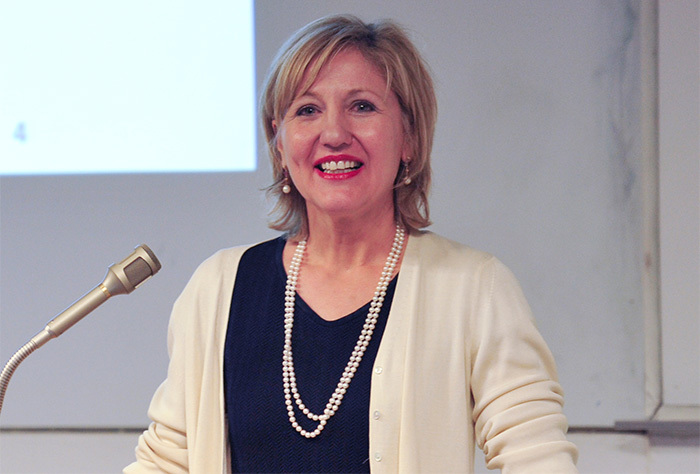High-impact medical research wanted, says new MRC president
21 August 2014 | Story by Newsroom
The South African Medical Research Council (MRC) is interested in big ideas, big science and high-impact research, says new MRC president Professor Glenda Gray.
"We want to promote the knowledge economy," said Gray, guest speaker at the Faculty of Health Sciences' Dean's Seminar on 18 August, where she presented her vision for the MRC.
That vision includes capacity building and long-term sustainability.
'What has our value been since [the MRC's formation] in 1969? We must be able to say that we made an impact on health in the country.'
Gray has a long pedigree. A National Research Foundation A-rated researcher and pioneer in the field of mother-to-child transmission of HIV, she co-founded and led the internationally renowned Perinatal HIV Research Unit at the Chris Hani Baragwanath Hospital in Soweto.
She is also co-principal investigator of the HIV Vaccines Trials Network (HVTN) and director of the HVTN International Programmes. In 2013 she received the country's highest national honour; the Order of Mapungubwe, granted by the president for international achievements that have served South Africa's interests.
Now at the helm of the MRC, Gray is concerned about the kind of research the MRC funds, how much is being spent on it, and whether it's hitting target and being translated into policy and practice to address the country's "cocktail of epidemics".
Among her targets is a bigger pipeline of master's and PhD students, "as diverse at the country", to build long-term sustainability in health services.
Technology and innovation is also high on her priority list ('A healthy country is a wealthy country'), as is investment in research and development.
The MRC has also established a new innovation entity. "There's a lot of innovation in the health sector and we look forward to great things from that project."
South Africa's performance in the medical science arena matters, she added.
"It's been shown that scientific productivity is a much better predictor of economic wealth and human development than any other variable.
"While we want to boost our research, we also want to make sure it addresses our country's needs."
To this end, the MRC had undergone revitalisation process, and a "brutal examination" of its programmes and expenditure.
UCT, she reminded the audience, enjoys the lion's share of MRC funding (the health sciences faculty hosts eight MRC-funded units), but like other university units and programmes funded by the MRC, UCT should demonstrate good returns on that money.
"I want to look at the science you're doing and ask the question: is it making a difference ... Are we asking the right questions?
"I'm on your case to see that we get value for money," she quipped. "We want to develop a culture of better evaluation of our programmes."
Gray also has a plan to boost support for poorly resourced universities.
"One of the questions we'll be asking is: how are you supporting these institutions?"
After Gray's presentation, three young researchers (under the age of 40) collected Faculty Research Committee (FRC) Young Investigators Best Publication 2013 Awards: Dr Jonathan Peter (clinical sciences category), Dr Krisnamoorthy Gopinath (basic sciences) and Dr Leigh Johnson (public health and rehabilitation sciences).
Story by Helen Swingler. Image Je'nine May.
 This work is licensed under a Creative Commons Attribution-NoDerivatives 4.0 International License.
This work is licensed under a Creative Commons Attribution-NoDerivatives 4.0 International License.
Please view the republishing articles page for more information.










